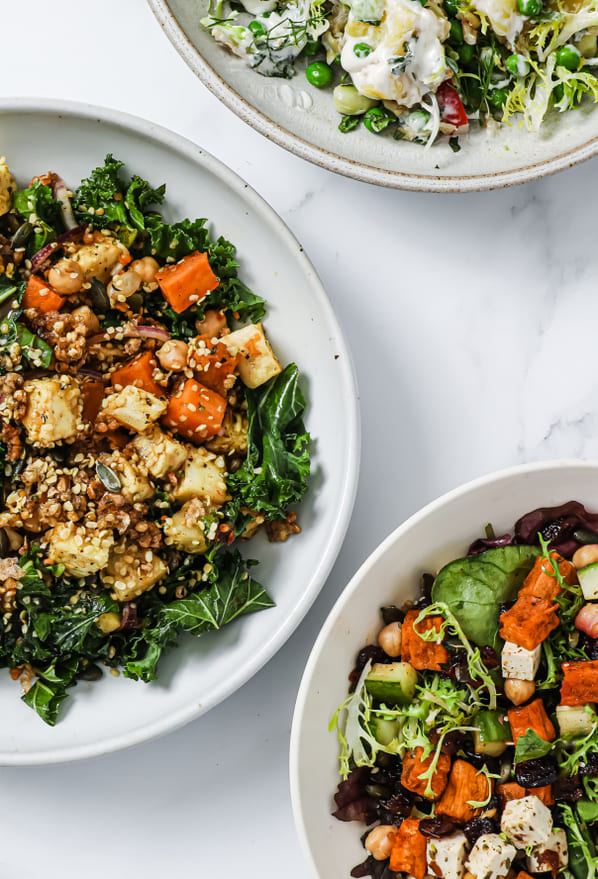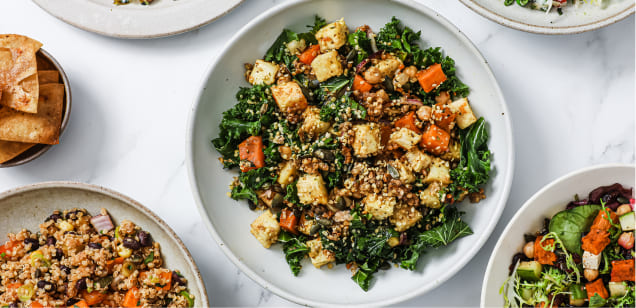How to avoid deficiencies in a plant-based diet
Plant-based diets boast to be miracle healers. They can reverse years of damage to the heart, aid weight loss, and promote healthy immune systems all while healing the planet. Yet some possible side effects are important to keep in mind when switching to veganism.
Here are the good, the bad and the ugly parts of going plant-based and how to make your transition into plant-based eating healthy and healing!
As we all know, the human body requires certain levels of fats, proteins, carbs, vitamins and minerals to function well. When we remove food from our diet, we are removing a source of all these components to good health. This can allow for a healthier source to take its place, for example swapping bacon and eggs which are high in protein and fat for ‘scrambled’ tofu and avocado which share these components, contain low saturated fat, no cholesterol and are less inflammatory. That seems like a pretty good trade, right?
Essentially, yes. By choosing a plant-based option, you’re mitigating the risk of eating animal products that consumed over a lifetime have been found to exacerbate poor health. Yet, if you ate plant-based substitutions based on the well known ‘healthy food plate’ endorsed by the NHS, you might find yourself feeling sub-par after a couple of months.
Why is this? Plant-based food is abundant, healthy and provides a great variety of nutrients. However, we do have to have an awareness of the certain components of animal products that are more difficult to find or absorb in plant produce. More importantly, we need to learn to recognise the signs of when we are lacking in something so that we know when to increase our intake of certain plant-based ingredients.
Nutrient deficiencies are not only a concern in plant-based diets. They are highly prevalent in all modern diets but certain deficiencies are more common when eating a vegan diet.
Vitamin B12
The most prevalent nutrient deficiency in a plant-based diet is vitamin B12 as it isn’t easily found within most plant-based sources.
Vitamin B12 helps keep blood and nerve cells healthy and aids the creation of DNA in the body. If you have a B12 deficiency, you may also develop B12 deficient anaemia, a condition that stops the healthy production of red blood cells.
Some common symptoms of B12 deficiency include:
- Fatigue
- An overall lack of energy
- Pins and needles
- Mouth ulcers
- Muscle weakness
There are many ways to incorporate B12 into a vegan diet. You can take supplements, the best kinds are spray supplements as the body can absorb the vitamins easier. Fortified plant-based milk such as oat or soy, fortified cereals and nutritional yeast are also great sources!
Omega-3s
Omega-3s support brain and heart function. We often associate omega 3 with fatty fish such as salmon. However, even a plant-based diet can be rich in this fatty acid!
Symptoms of Omega-3 deficiency include:
- Fatigue
- Poor memory
- Dry skin
- Low mood
- Poor circulation
Great plant-based sources of Omega-3s include nuts, seeds (chia seeds are great), healthy oils such as rapeseed oil and even omega-3 fortified foods such as cereal. There are also great supplements available if you aren’t able to incorporate certain foods into your diet.
Iron
Many people associate vegetarian and vegan diets with low iron and iron-deficient anaemia. Yet, iron is plentiful in plants! It is important when changing to a vegan diet, to understand what foods you should abundantly eat to maintain healthy iron levels. This is particularly important for women, though everyone needs iron daily.
Iron is essential for healthy red blood cells that carry oxygen around the body and also for supporting the brain.
Symptoms of iron deficiency to watch out for include:
- Stomach aches and poor digestion
- Tiredness
- Feeling dizzy (especially when standing up)
- Poor concentration or memory
- Weakened immunity - for example, you’re catching more colds than usual!
Great plant-based sources of iron include beans and legumes, tofu, cashews, seeds, kale and leafy greens, apricots, quinoa and fortified foods such as plant milk or cereal. When paired with vitamin C sources such as orange juice or citrus fruits, iron absorption is increased. However, drinking tea or coffee can disrupt iron absorption, so it’s best to avoid these drinks around mealtimes.
Some people greatly benefit from iron supplements, the best option is liquid supplements as they are gentle on the digestive system.
It is important to have an abundant and satiating diet. Plant-based diets are colourful and full of health-promoting qualities and you shouldn’t struggle with deficiencies provided you have a balanced plate and eat a variety of plants and protein sources.
Do you have any of the common nutrient deficiency symptoms? We suggest adding more ingredients to your meals, eating enough calories per day and avoiding hyper-processed foods.
At Holy, all of our meal plans are created to meet all nutritional needs. We count the macros, vitamins and minerals to the milligram to ensure our food is always nourishing your body. If you are concerned about meeting your nutritional needs on a vegan diet, you can find our meal plans online now.
References:
- Kate Barrington. The top 5 nutrient deficiencies on a plant based diet. Nature's Path Organic. 2018.
- Sakkas, Hercules et al. “Nutritional Status and the Influence of the Vegan Diet on the Gut Microbiota and Human Health.” Medicina (Kaunas, Lithuania) vol. 56,2 88. 2020.
- 7 Nutrients That You Can’t Get from Plants. Healthline. 2021.
- Aaron Kandola. How to avoid deficiencies in a vegan diet. Medical News Today. 2021.
- Eat Well. NHS.
- Vitamin B12 or folate deficiency anaemia. NHS.
- Vitamin B12. National Institute of Health.
- Omega-3 Fatty Acids. National Institute of Health.



